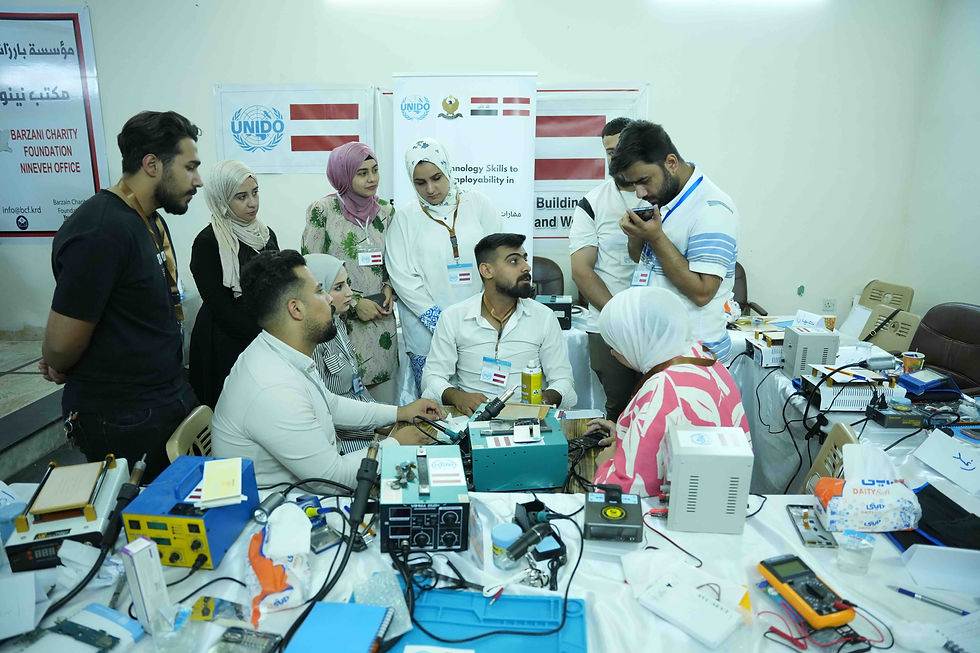Building Futures Through Mobile Phone Repair: Young Iraqis Find Hope in Practical Skills

Building Futures Through Mobile Phone Repair: Young Iraqis Find Hope in Practical Skills
8/8/25, 4:00 AM
For many young people in Iraq, finding a job after years of conflict and displacement is a struggle. In the governorates of Nineveh and Duhok, UNIDO’s initiative, “Digital technology skills to enhance employability in Iraq,” supported by the Austrian Government, is helping change that.
For many young people in Iraq, finding a job after years of conflict and displacement is a struggle. In the governorates of Nineveh and Duhok, UNIDO’s initiative, “Digital technology skills to enhance employability in Iraq,” supported by the Austrian Government, is helping change that. The project trains youth from host communities, returnees, internally displaced persons (IDPs), and refugees in practical digital skills tailored to the local job market.
In Nineveh, a standout component of the initiative is the mobile phone maintenance and repair course. Blending hands-on technical training with entrepreneurship education, the course empowers participants to either launch their own businesses or pursue employment in the growing mobile repair sector—one repaired phone at a time.
Trainees are selected based on their basic computer literacy and demonstrated motivation. During the course, they learn to troubleshoot and repair common mobile phone issues such as screen replacements, charging port repairs, and internal hardware fixes. In parallel, they develop foundational skills in business planning, marketing, and customer service, preparing them to operate independently.
To further ease the transition into self-employment, UNIDO provides top-performing graduates with a complete start-up toolkit. This practical support removes the barrier of expensive equipment and gives young entrepreneurs a tangible head start toward establishing their own income-generating ventures.
Twenty-four-year-old Muna Ahmed, a management and economics graduate who completed the programme, said, “For me, it was more than just a course—it was a chance to create my own future. I haven’t been able to find a job since graduating, and I don’t want to lose the momentum I have. This training gave me both the technical and business skills I need. I’m ready to start my own repair workshop if I get the tools. The Entrepreneurship Development Programme wasn’t just classroom talk. We learned how to handle challenges, attract customers, and build something sustainable.”
Participant Bassam Shahab, 30, had long dreamed of owning his own repair shop. “I always wanted to open one, but I lacked the technical background,” he said. “Now I know how to replace phone screens and other components, and I feel confident to take the next step.”
Shahab emphasized the programme’s accessibility. “What’s great is that it doesn’t require years of education. If you’re interested and willing to learn, you can benefit.”
In Mosul, Nineveh, where affordable device repair is scarce and demand is high, phone repair skills are invaluable. A fully functioning mobile phone is essential for communication, work, education, and safety, making this trade both valuable and sustainable.
Ehab Yaseen, the senior trainer of the course, said, “Our goal was to ensure trainees could immediately start working—whether at home, in a shop, or setting up their own business. Most can now troubleshoot and repair various mobile phones. They’re not just skilled—they’re confident.”
UNIDO’s mobile phone repair programme is more than just technical training; it represents a pathway to resilience, dignity, and renewal. By equipping young Iraqis with both the practical tools and personal confidence to rebuild their lives, the initiative empowers them to support their families and contribute meaningfully to their communities. In every repaired device lies a story of recovery, and in every graduate, a spark of hope for a more inclusive and self-reliant future.
